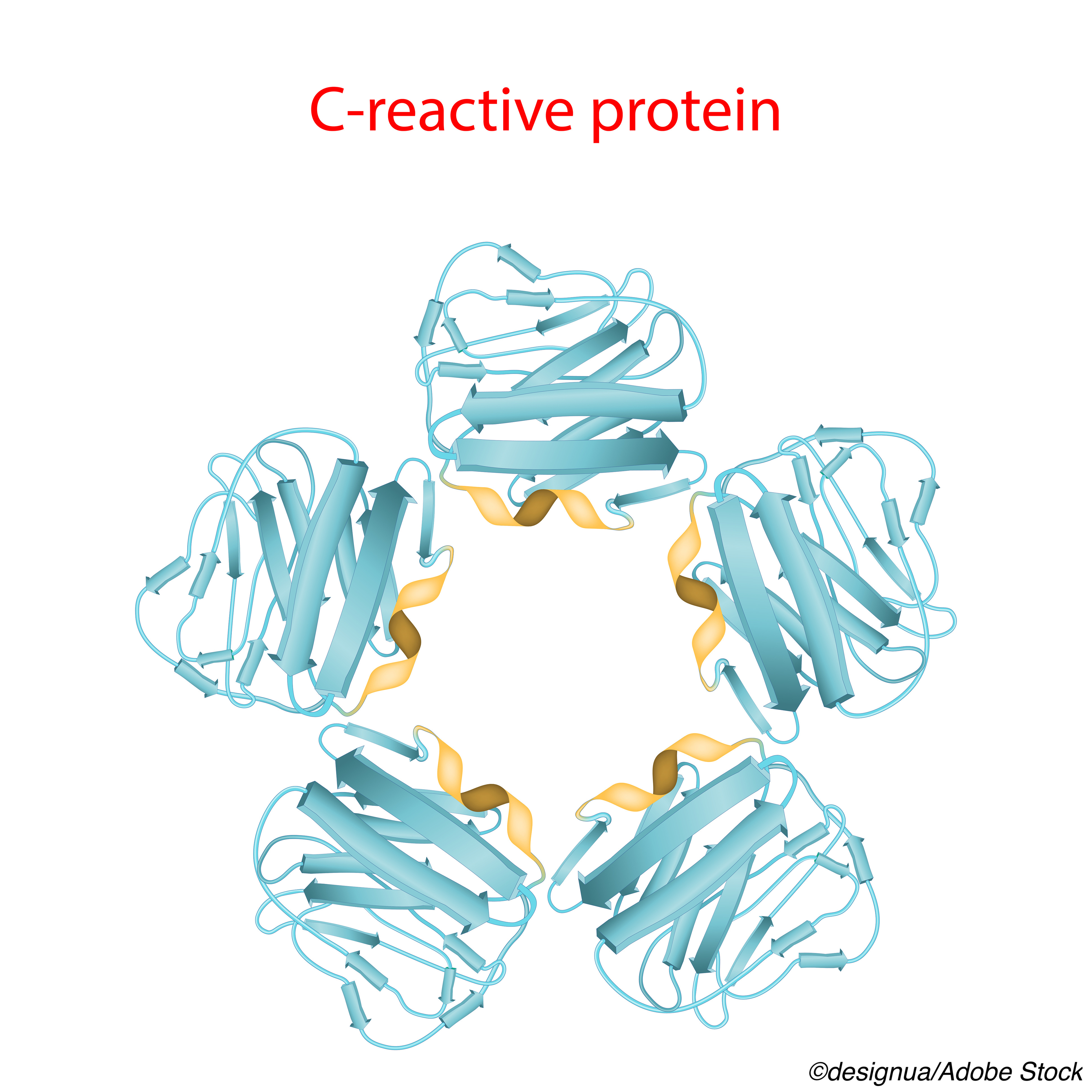A baseline C-reactive protein (CRP) level of less than 150 mg/L was highly predictive of response to an investigational therapy targeting Covid-19 cytokine storm in the phase III LIVE-AIR trial.
Newly reported findings from the trial of the novel anti-granulocyte macrophage colony stimulating factor (GM-CSF) monoclonal antibody lenzilumab showed the therapy to be associated with a two-fold improvement in mortality, compared to placebo, in patients hospitalized with Covid-19.
Among patients with baseline CRP levels below 150 mg/L who were also younger than 85 years of age, treatment with lenzilumab was associated with a three-fold improvement is survival without the need for ventilation, compared to placebo
Initial findings from the LIVE-AIR trial showed an overall 54% improvement in survival without ventilation (SWOV), compared to placebo, in the study cohort of 520 patients. These findings were published on the independent server medRxiv, and they have not been peer-reviewed.
This early analysis also showed a 92% improvement in survival without ventilation in study participants treated with corticosteroids and remdesivir (HR, 1.92; 95% CI, 1.20-3.07, nominal P=0.0067). SWOV was improved by 88% in participants hospitalized two days or less prior to randomization (HR, 1.88; 95% CI, 1.13-3.12, nominal P=0.015).
The latest LIVE-AIR exploratory analysis, which focused on patients with CRP levels less than 150 mg/L at enrollment, was presented this week in a late-breaking poster session at the virtual meeting CHEST 2021.
Early last month, the FDA rejected biologic company Humanigen’s request for emergency use authorization (EUA) for lenzilumab, asking for additional data on the investigational anti-GM-CSF drug for the treatment of patients hospitalized with Covid-19.
In a press statement issued at the time, the company noted that results from the ongoing National Institutes of Health (NIH)-sponsored ACTIV-5/BET-B trial should “provide further data that may support a new EUA request.” That trial is scheduled for completion at the end of 2021.
Infectious disease specialist and lead researcher Zelalem Temesgen, MD, of Mayo Clinic, Rochester, Minnesota, presented the latest LIVE-AIR trial data via video.
Temesgen noted that lenzilumab improved the likelihood of survival without ventilation in the patients hospitalized with Covid-19 who needed supplemental oxygen but did not yet require invasive mechanical ventilation.
“CRP less than 150 mg/L predicted the greatest improvements in survival without ventilation with lenzilumab treatment,” Temesgen said.
The researcher noted that while GM-CSF was initially described as a hematopoietic growth factor, “it is now well understood to be a key mediator of inflammation and tissue injury.”
“GM-CSF stimulates the production of myeloid cells, resulting in the release of inflammatory cytokines, over-activation of T cells, and recruitment and trafficking of monocytes to the lungs, thus contributing to the pathology of severe Covid-19 disease,” Temesgen explained. “Lenzilumab is a humanized GM-CSF neutralizing monoclonal antibody with a high specificity to human germline sequences that result in reduced immunogenicity.”
Study participants received either lenzilumab (600 mg, n=261) or placebo (n=259) given as three intravenous infusions administered 8 hours apart, and they were followed through follow-up day 28.
Temesgen noted that baseline demographics were comparable between the two treatment groups: 64.7% were male; mean age, 60.5 years; mean BMI, 32.5 kg/m2
A total of 78% of study participants had baseline CRP levels below 150 mg/L. Most (93.7%) were treated with steroids, remdesivir, (72.4%) or both (69.1%). Lenzilumab (n=159) was found to improve the likelihood of SWOV by 3.04-fold in participants with CRP <150 mg/L and age <85 years (HR, 3.04; 95% CI, 1.68-5.51, nominal P=0.0003) compared with placebo (n=178). The incidence of invasive mechanical ventilation, ECMO, or death was also reduced with the drug (OR: 0.31; 95% CI: 0.15-0.63, P=0.002) and mortality improved by 2.22-fold (OR: 2.22; 95% CI: 1.07-4.67, P=0.034). Compared with placebo, lenzilumab decreased CRP as early as Day 2 following treatment, and by Day 28 it decreased CRP by 38% versus placebo (24.4±3.4 mg/L versus 39.1±4.9 mg/L). “No reported serious adverse events, including increased risk of infections, cases of pulmonary alveolar proteinosis (PAP), differences in laboratory or hematology parameters, or infusion-related reactions attributed to lenzilumab were observed. CRP-guided lenzilumab administration may offer a simple and effective treatment optimization,” Temesgen concluded. A baseline C-reactive protein (CRP) level of less than 150 mg/L was highly predictive of response to the investigational therapy lenzilumab, which targets Covid-19 cytokine storm, in the phase III LIVE-AIR trial. Among patients with baseline CRP levels below 150 mg/L who were also younger than 85 years of age, treatment with lenzilumab was associated with a three-fold improvement is survival without the need for ventilation, compared to placebo. Salynn Boyles, Contributing Writer, BreakingMED™ The LIVE-AIR trial was supported by Humanigen, Inc, which is developing lenzilumab. Dr. Temesgen also received unrestricted education support from Gilead, ViiV, and Merck. Presenting researcher Zelalem Temesgen reported no relevant disclosures. Other researchers reported being employees of Humangin or CTI Clinical Trial and Consulting, Inc. Cat ID: 190 Topic ID: 79,190,730,933,190,926,192,927,225,929,925,934,224



